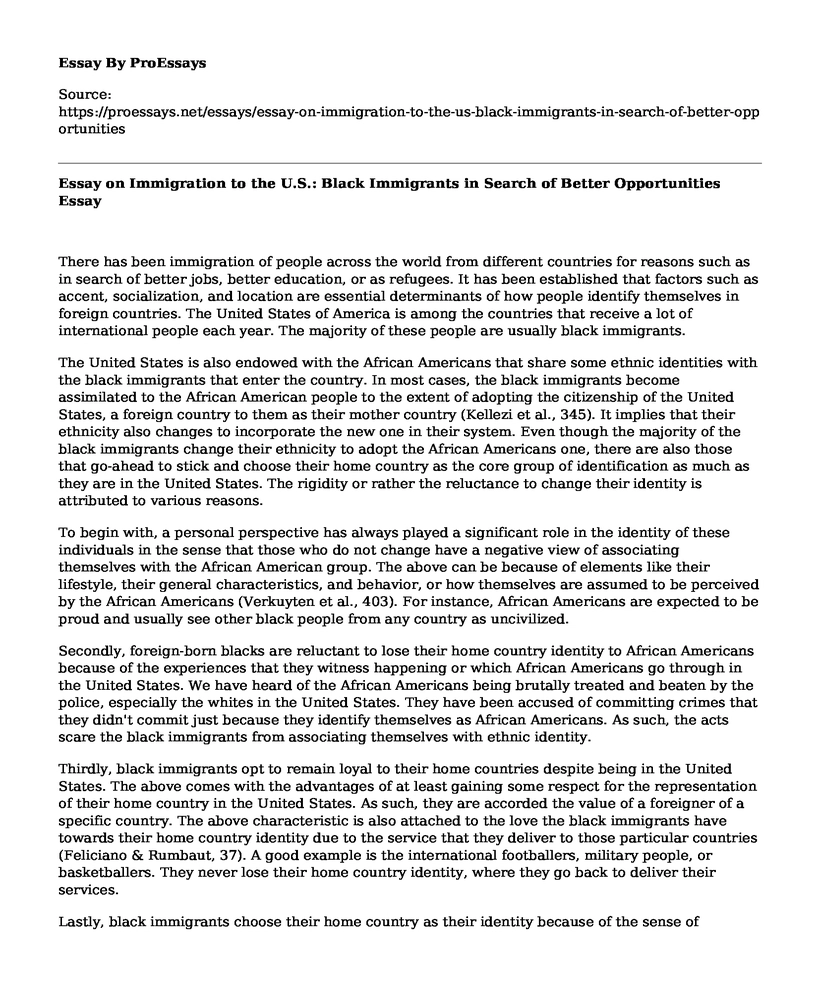There has been immigration of people across the world from different countries for reasons such as in search of better jobs, better education, or as refugees. It has been established that factors such as accent, socialization, and location are essential determinants of how people identify themselves in foreign countries. The United States of America is among the countries that receive a lot of international people each year. The majority of these people are usually black immigrants.
The United States is also endowed with the African Americans that share some ethnic identities with the black immigrants that enter the country. In most cases, the black immigrants become assimilated to the African American people to the extent of adopting the citizenship of the United States, a foreign country to them as their mother country (Kellezi et al., 345). It implies that their ethnicity also changes to incorporate the new one in their system. Even though the majority of the black immigrants change their ethnicity to adopt the African Americans one, there are also those that go-ahead to stick and choose their home country as the core group of identification as much as they are in the United States. The rigidity or rather the reluctance to change their identity is attributed to various reasons.
To begin with, a personal perspective has always played a significant role in the identity of these individuals in the sense that those who do not change have a negative view of associating themselves with the African American group. The above can be because of elements like their lifestyle, their general characteristics, and behavior, or how themselves are assumed to be perceived by the African Americans (Verkuyten et al., 403). For instance, African Americans are expected to be proud and usually see other black people from any country as uncivilized.
Secondly, foreign-born blacks are reluctant to lose their home country identity to African Americans because of the experiences that they witness happening or which African Americans go through in the United States. We have heard of the African Americans being brutally treated and beaten by the police, especially the whites in the United States. They have been accused of committing crimes that they didn't commit just because they identify themselves as African Americans. As such, the acts scare the black immigrants from associating themselves with ethnic identity.
Thirdly, black immigrants opt to remain loyal to their home countries despite being in the United States. The above comes with the advantages of at least gaining some respect for the representation of their home country in the United States. As such, they are accorded the value of a foreigner of a specific country. The above characteristic is also attached to the love the black immigrants have towards their home country identity due to the service that they deliver to those particular countries (Feliciano & Rumbaut, 37). A good example is the international footballers, military people, or basketballers. They never lose their home country identity, where they go back to deliver their services.
Lastly, black immigrants choose their home country as their identity because of the sense of belonging that they have for their original ethnic identity, which they believe is more than having been in the United States. The above surpasses the mere understanding of a sense of individuality that emanates from the cultural influences. As much as there is movement between cultures, the identity of an individual is difficult to be fixed.
Works cited
Feliciano, Cynthia, and Ruben G. Rumbaut. "Varieties of ethnic self-identities: Children of immigrants in middle adulthood." RSF: The Russell Sage Foundation Journal of the Social Sciences 4.5 (2018): 26-46.
Kellezi, Blerina, et al. "Understanding and coping with immigration detention: Social identity as cure and curse." European Journal of Social Psychology 49.2 (2019): 333-351.
Verkuyten, Maykel, et al. "To be both (and more): Immigration and identity multiplicity." Journal of Social Issues 75.2 (2019): 390-413.
Cite this page
Essay on Immigration to the U.S.: Black Immigrants in Search of Better Opportunities. (2023, Apr 24). Retrieved from https://proessays.net/essays/essay-on-immigration-to-the-us-black-immigrants-in-search-of-better-opportunities
If you are the original author of this essay and no longer wish to have it published on the ProEssays website, please click below to request its removal:
- Essay on Sexual Harassment in the Workplace
- Political, Socioeconomic, and Cultural Development in China Between 770 B.C AND 907 A.D
- Paper Example on Human Trafficking: Millions Trafficked Illegally Each Year
- Essay Sample on U.S. Economy Evaluation: DPI & PCE Chained Dollars
- Achieving Equality: Closing Gender Gaps Through Board Proportions - Essay Sample
- WWII: Fascism and Japan's Expansionism Lead to War - Essay Sample
- Pregnant Women and Cannabis Use: Exploring the Impact of Legalization - Essay Sample







